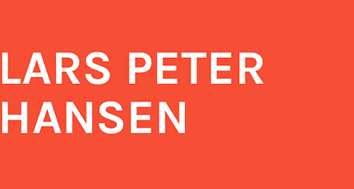Generalized Instrumental Variables Estimation of Nonlinear Rational Expectations Models
This paper describes a method for estimating and testing nonlinear rational expectations models directly from stochastic Euler equations. The estimation procedure makes sample counterparts to the population orthogonality conditions implied by the economic model close to zero. An attractive feature of this method is that the parameters of the dynamic objective functions of economic agents can be estimated without explicitly solving for the stochastic equilibrium.
(See also “Correction,” Econometrica 52(1): 267-268, January 1984.)
@article{hansensingleton:1982,
title={Generalized Instrumental Variables Estimation of Nonlinear Rational Expectations Models},
author={Hansen, Lars Peter and Singleton, Kenneth J.},
journal={Econometrica: Journal of the Econometric Society},
pages={1269–1286},
year={1982},
publisher={JSTOR}
}
Large Sample Properties of Generalized Method of Moments Estimators
This paper studies estimators that make sample analogues of population orthogonality conditions close to zero. Strong consistency and asymptotic normality of such estimators is established under the assumption that the observable variables are stationary and ergodic. Since many linear and nonlinear econometric estimators reside within the class of estimators studied in this paper, a convenient summary of the large sample properties of these estimators, including some whose large sample properties have not heretofore been discussed, is provided.
@article{hansen:1982,
title={Large Sample Properties of Generalized Method of Moments Estimators},
author={Hansen, Lars Peter},
journal={Econometrica: Journal of the Econometric Society},
pages={1029--1054},
year={1982},
publisher={JSTOR}
}
✕ Instrumental Variables Procedures for Estimating Linear Rational Expectations Models
This paper illustrates how to use instrumental variables procedures to estimate the parameters of a linear rational expectations model. These procedures are appropriate when disturbances are serially correlated and the instrumental variables are not exogenous. We compare our procedures to some alternative estimators that estimate free parameters from restrictions implied by the Euler equations. The procedures are applicable to a variety of linear rational expectations models, several examples of which we cite.
@article{hansen:1982,
title={Instrumental Variables Procedures for Estimating Linear Rational Expectations Models},
author={Hansen, Lars Peter and Sargent, Thomas J},
journal={Journal of Monetary Economics},
volume={9},
number={3},
pages={263--296},
year={1982},
publisher={Elsevier}
}
✕ A Note on Wiener-Kolmogorov Prediction Formulas for Rational Expectations Models
A prediction formula for geometrically declining sums of future forcing variables is derived for models in which the forcing variables are generated by a vector autoregressive-moving average process. This formula is useful in deducing and characterizing cross-equation restrictions implied by linear rational expectations models.
@article{hansensargent:1981note,
title={A Note on Wiener-Kolmogorov Prediction Formulas for Rational Expectations Models},
author={Hansen, L. P. and Sargent, T. J.},
journal={Economics Letters},
volume={8},
number={3},
pages={255–260},
year={1981},
publisher={Elsevier}
}
Linear Rational Expectations Models for Dynamically Interrelated Variables
@incollection{hansensargent:1981linear,
title={Linear Rational Expectations Models of Dynamically Interrelated Variables},
author={Hansen, L. P. and Sargent, T.J.},
booktitle={Rational Expectations and Econometric Practice},
year={1981},
publisher={University of Minnesota Press}
}
Formulating and Estimating Dynamic Linear Rational Expectations Models
This paper describes methods for conveniently formulating and estimating dynamic linear econometric models under the hypothesis of rational expectations. An econometrically convenient formula for the cross-equation rational expectations restrictions is derived. Models of error terms and the role of the concept of Granger causality in formulating rational expectations models are both discussed. Tests of the hypothesis of strict econometric exogeneity along the lines of Sims’s are compared with a test that is related to Wu’s.
@article{hansen:1980formulating,
title={Formulating and Estimating Dynamic Linear Rational Expectations Models},
author={Hansen, Lars Peter and Sargent, Thomas J},
journal={Journal of Economic Dynamics and Control},
volume={2},
pages={7--46},
year={1980},
publisher={Elsevier}
}
✕ Forward Exchange-Rates as Optimal Predictors of Future Spot Rates-An Econometric Analysis
This paper studies estimators that make sample analogues of population orthogonality conditions close to zero. Strong consistency and asymptotic normality of such estimators is established under the assumption that the observable variables are stationary and ergodic. Since many linear and nonlinear econometric estimators reside within the class of estimators studied in this paper, a convenient summary of the large sample properties of these estimators, including some whose large sample properties have not heretofore been discussed, is provided.
@article{hansen:1980,
title={Forward Exchange Rates as Optimal Predictors of Future Spot Rates: An Econometric Analysis},
author={Hansen, Lars Peter and Hodrick, Robert J},
journal={Journal of Political Economy},
volume={88},
number={5},
pages={829–853},
year={1980},
publisher={The University of Chicago Press}
}
A Note on First Degree Stochastic Dominance
A link is established between stochastic dominance and a different dominance relationship which we call pointwise dominance. This provides the basis for making several comparisons of expected values of non-decreasing functions of random variables. We discuss economic problems for which the application of stochastic dominance results depends on this link.
@article{hhp:1978,
title={A Note on First Degree Stochastic Dominance},
author={Hansen, Lars Peter and Holt, Charles A and Peled, Dan},
journal={Economics Letters},
volume={1},
number={4},
pages={315--319},
year={1978},
publisher={Elsevier}
}
✕ 